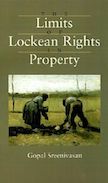
Author – By: Gopal Sreenivasan
This book discusses Locke’s theory of property from both a critical and an interpretative standpoint. The author first develops a comprehensive interpretation of Locke’s argument for the legitimacy of private property, and then examines the extent to which the argument is really serviceable in defense of that institution. He contends that a purified version of Locke’s argument–one that adheres consistently to the logic of Locke’s text while excluding considerations extraneous to his logic–actually does establish the legitimacy of a form of private property. This version, which is both defensible in contemporary, secular terms and is, essentially, egalitarian, should provoke a reassessment of the nature of Locke’s relevance to contemporary discussions of distributive justice.
Industry Reviews
“The book is clear and focused; the argument is compact; relevant secondary literature is respectfully treated.”–Political Theory “…an excellent text for an upper level or graduate seminar on Lockean political philosophy, or on the philosophical foundations of property rights. It has the virtue of being short and readable. It is creative in the theory of property developed out of key elements of Locke’s work, and scholarly in its careful examination of Lockean texts.”–Teaching Philosophy “…this work provides a meticulous account of Locke’s theory in such a way that it becomes more relevant to the ideals of secular modernity.”–The Review of Metaphysics “The book is clearly written and tightly argued.”–Ethics “…an instructive and well-crafted piece of work, which all those interested in Locke’s, or neo-Lockean, political philosophy could read with profit.”–The Philosophical Review “The book is clear and focused; the argument is compact; relevant secondary literature is respectfully treated.”–Political Theory “…an excellent text for an upper level or graduate seminar on Lockean political philosophy, or on the philosophical foundations of property rights. It has the virtue of being short and readable. It is creative in the theory of property developed out of key elements of Locke’s work, and scholarly in its careful examination of Lockean texts.”–Teaching Philosophy “…this work provides a meticulous account of Locke’s theory in such a way that it becomes more relevant to the ideals of secular modernity.”–The Review of Metaphysics “The book is clearly written and tightly argued.”–Ethics